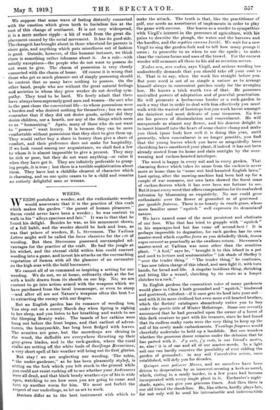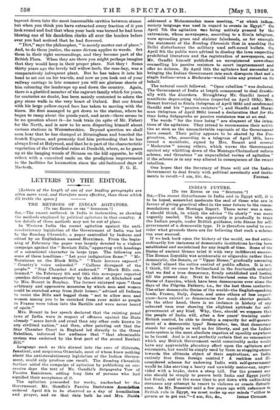WEEDS.
WEEDS postulate a weeder, and the enthusiastic weeder would asseverate that it is the practice of this craft which makes the garden " the purest of human pleasures." Bacon could never have been a weeder ; he was content to walk in his " alleys spacious and fair." It was in that that he found his delight. Besides he was, as his monument shows, of a full habit, and the weeder should be lank and lean, as was that prince of weeders, R. L. Stevenson. The Vailima Letters might well be called the locus classicus for the t rt of weeding. But then Stevenson possessed unexampled ad- vantages for the practice of the craft. He had the jungle at his wicket, and the eternal child within him could convert weeding into a game, and invest his attacks on the encroaching vegetation of Samoa with all the glamour of an encounter on the high seas with the bold buccaneer.
We cannot all of us command so inspiring a setting for our weeding. We do not, we at home, ordinarily slash at the foe with a knife drawn from its sheath on our hip. No; we are content to go into action armed with the weapons which we have purchased from the local ironmonger, or even to stoop —and after all are not Nature's weapons often the best f- to extracting the enemy with our fingers.
But an English garden has its romance of weeding too. You step out on a sunny March day when Spring is sighing in her sleep, and you listen to her breathing and watch to see the Sleeping Beauty wake. The tassels of her catkins were hung out before the frost began, and that earliest of adven- turers, the honeysuckle, has long been fledged with leaves. The aconites are gone, but the snowdrops are shining in the wood, the daffodils are everywhere thrusting up their grey-green blades, and in the rock-garden, where the coral stalks ace setting off the white buds of Saxifraga Buraeriana, a very short spell of fair weather will bring out its first: glories.
But stay ! we are neglecting our weeding. The robin, "the under-gardener," as he has been pleasantly styled, is sitting on the fork which you left stuck in the ground while you could not resist rushing off to see whether your Androsaces were all dead, and that black beady weather-eye of his is wide open, watching to see how soon you are going to come and turn up another worm for him. We must not forfeit the respect of our underlings, so let us set to work.
Doctors differ as to the best instrument with which to
make the attack. The truth is that, like the practitioner of golf, one needs an assortment of implements in order to play the game with success. One learns as a weeder to sympathize with Virgil's interest in the processes of agriculture, with his pains to describe the plough, the wain and the harrows and the hurdles, and the mystica rannus laechi. We wait for a new Virgil to sing the garden-fork and to tell how many prongs it owns ; to prescribe to us when to use the spade ; to make clear the various forms and uses of the trowel. For the earnest weeder will summon all these to his aid as occasion serves.
Nudus ara, sere nudus, says Virgil, and serious weeding too undoubtedly demands that you should take off your coat to it. That is to say, when the work lies straight before you. But your weed is not of so simple a nature as to arrange himself always in convenient patches ready for the avenging hoe. He knows a trick worth two of that. He possesses unrivalled powers of adaptation and of peaceful penetration. He will permeate a herbaceous border or a rock-garden in such a way that in order to deal with him effectively you must walk with the wariest of footsteps lest you work havoc amongst the daintiest and most delicate of your treasure& No less are his powers of dissimulation and concealment. He will masquerade as almost any flower, and his dearest delight is to insert himself into the heart of some choice clump and make you think (poor fool) how well it is doing this year, until presently, when concealment is no longer possible, you find that the young leaves which you have so misguidedly been cherishing have smothered your plant, if indeed it has not been already ousted from its home and slain outright by the over- weening and cuckoo-hearted interloper.
The weed is happy in every soil and in every garden. The` charming flower which takes its name from the cuckoo is never more at home than in "some wet bird-haunted English lawn." Last spring, after the mowing-machine had been laid up for a couple of war summers, our own lawn showed the finest mass of cuckoo-flowers which it has ever been our fortune to see. But itis not every weed that offers compensation for its unabashed intrusion by blossoming so exquisitely. No one could grow enthusiastic over the flower of groundsel or of goutweed -- par ignobile fratrum. There is no beauty in couch-grass, whose more familiar name " squitch " well expresses its demoniacal nature.
We have named some of the most persistent and obstinate of our foes. Who that has tried to grapple with " squiteh " in his asparagus-bed but has come off second-best I It is perhaps impossible to dogmatize, for cads garden has its own master-weed which expel(as fume as you deludedly think, lamest nape recurret as punctually as the swallows return. Stevenson■ master-weed at Vailima was none other than the sensitive plant. "A fool," says he, "brought it to this island in a pot and used to lecture and sentimentalize " (oh shade of Shelley !) " over the tender thing." The tender thing," he continues, " has now taken charge of this island, and men fight it, with torn hands, for bread and life. A singular insidious thing, shrinking and biting like a weasel, clutching by its roots as a limpet clutches to a rock."
In English gardens the consentient voice of many gardeners would place in Claes I both groundsel and " squiteh," bindweed and goutweed, coltsfoot.—if it once gets its hoof into your soil— and with it its more civilized but even more evil-hearted brother, which the florists' catalogues shamelessly entice you to buy under the poetic title of Winter Heliotrope. Some one recently announced that he had prevailed upon the owner of a forest of this dark creature to part with his treasure, since he had found that its endless snaky roots were the very thing to keep up the soil of his newly made embankments. Tussilago fragrans would cheerfully undertake to hold up a landslide. But one wonders whether the generous donor remains under the delusion that he has parted with it. J'p suis, j'y reek, is our friend's motto, as, alas ! it is of one and all of our master-weeds, In a light soil one can hardly conceive the possibility of ever ridding the garden of groundsel : in any soil Conrolculus minor, once established, will defy you for decades.
Quisque sues patimur Manes, and we ourselves have been driven to desperation by so innocent-seeming a herb as sorrel, which, rioting in a sandy border, in a few years had become incorporated with every single plant in it. Enchanter's night- shade, again, can give you grievous times. And then there is our old friend the dandelion. He, like others, hardly plays fair, for not only will he send his interminable and indestructible
taproot down into the moat inaccessible cavities between stones but when you think you have extracted every fraction of it you look round and find that when your bask was turned he had been
blowing one of his dandelion cloaks all over the borders before
ever you had noticed that he had flowered.
" Dirt," says the philosopher, " is merely matter out of place." And, to do them justice, the game dictum applies to weeds. Set them in their right surroundings, and they become part of the British Flora. When they are there you might perhaps imagine that they would keep in their proper place. Not they I Some thirty years ago the lovely tall willow-herb, the rose-bay, was a comparatively infrequent plant. But he has taken it into his head to set out on his travels, and now as you look out of your railway carriage in late summer you will see glorious sheets of him colouring the landscape up and dawn the country. Again, there is a glorified member of the ragwort family which for years, for centuries no doubt, has been mainly contented to adorn the grey stone wane in the very heart of Oxford. But our friend with his large yellow-rayed face has taken to moving with the times. He first managed to get down to the station, where he began to ramp about the goods-yard, and next—there seems to be no question about it—he took train (in spite of Mr. Fisher) for the North, and is now to be seen disporting himself about various stations in Worcestershire. Beyond question we shall soon hear that he has ohanged at Birmingham and boarded the Scotch Express, and presently find him pretending that he has always lived at Hoiyrood, and that he is part of the characteristic vegetation of the Cathedral ruins at Dunkeld, where, as he gazes up at the hanging woods of Birnam on the hill opposite, he will reflect with a conceited smile on the prodigious improvement in the facilities for locomotion since the old-fashioned days of



































 Previous page
Previous page